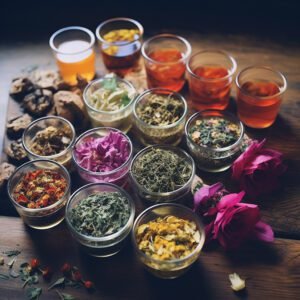
Chai Tea: Aromatic Comfort in Every Sip
The Allure of Chai: A Cultural Beverage with Universal Appeal
Chai tea, an aromatic blend of spices and black tea, has captivated hearts and taste buds worldwide. Its allure stems from its rich history, cultural significance, and versatility, transcending geographical boundaries to become a beloved beverage across cultures. In India, its birthplace, chai holds a prominent place in daily life, offering warmth and comfort during the day. Beyond its origins, chai has found its way into cafes and homes around the globe, gaining popularity for its distinct flavor and soothing properties.
Unveiling the Origins: Ancient Roots in India and Beyond
Chai tea's roots can be traced back to ancient India, where spices such as ginger, cinnamon, and cardamom were used in traditional Ayurvedic medicine for their healing properties. Over time, these spices were combined with black tea, creating a flavorful and invigorating beverage. As India's trade routes expanded, chai made its way to other parts of Asia and the Middle East, where it underwent regional variations and adaptations. Today, chai has become a global phenomenon, enjoyed by people from all walks of life.
Crafting the Perfect Brew: A Delicate Balance of Spices and Tea
The secret to a perfect cup of chai lies in the delicate balance of spices and black tea. The most common spices used in chai include ginger, cinnamon, cardamom, cloves, and black pepper, each contributing its unique flavor and aroma. The tea base for chai is typically a robust black tea, which provides the beverage with its rich color and caffeine content. The ratio of spices to tea can be adjusted to suit individual preferences, allowing for a customizable experience that caters to every palate.
A Spice Odyssey: Exploring the Aromatic Tapestry of Chai
The spices used in chai tea play a symphony of flavors on the tongue, creating a sensory experience that is both comforting and invigorating. Ginger adds a spicy warmth, while cinnamon offers a sweet and slightly woody note. Cardamom contributes a complex, slightly nutty flavor, balanced by the aromatic sweetness of cloves. Black pepper adds a subtle piquancy, rounding out the spice profile of chai. It is the harmonious blend of these spices that gives chai its distinctive and captivating character.
Black Tea Variations: The Foundation of Chai's Robust Flavor
The choice of black tea for chai is crucial, as it forms the backbone of the beverage's flavor and aroma. Assam black tea is a popular choice for chai due to its robust, malty flavor that pairs well with the spices. Darjeeling black tea, known for its delicate and floral notes, can create a more nuanced chai experience. Nilgiri black tea, with its slightly sweet and earthy character, offers a mellower base for chai. By experimenting with different black tea varieties, individuals can tailor their chai to their specific preferences.
Sweet and Savory Companions: Pairing Chai with a Symphony of Flavors
Chai tea's versatility extends beyond its solo enjoyment, as it pairs harmoniously with a range of flavors. Sweet treats like cookies, pastries, and cakes complement chai's spicy warmth, while savory snacks like samosas, pakoras, and naan provide a delightful contrast. Chai can also be enjoyed alongside fruits, nuts, and yogurt for a balanced and satisfying snack.
Chai Rituals: A Sensory Journey with Every Sip
Brewing and consuming chai is often more than just a beverage preparation; it's a sensory ritual that engages all the senses. The aroma of spices fills the air as the tea steeps, creating an inviting atmosphere. The gentle sipping of chai allows the flavors to slowly unfold on the palate, offering a moment of mindful indulgence. Chai rituals can vary across cultures, but they all share a common thread of comfort and shared experiences.
Health and Wellness Benefits: Chai's Healing Properties
Beyond its delectable taste, chai tea is also known for its potential health benefits. Ginger, a key ingredient in chai, has anti-inflammatory properties that can aid in digestion and reduce nausea. Cinnamon, another common spice, is believed to have antioxidant and anti-diabetic effects. Cardamom supports heart health and may help reduce blood pressure. Black tea, the base of chai, contains antioxidants that can protect against cellular damage. However, it's important to note that the health benefits of chai can vary depending on the specific ingredients and preparation methods used.
Chai Beyond the Teacup: Innovative Culinary Applications
Chai's versatility extends beyond the traditional teacup, finding its way into various culinary creations. Chai-infused desserts, such as cakes, cookies, and ice cream, offer a unique blend of flavors. Chai spices can be incorporated into savory dishes like curries, stews, and marinades, adding a warm and aromatic touch. Chai-spiced lattes and cappuccinos are popular coffeehouse beverages that combine the comforting flavors of chai with the energy boost of coffee.
Embracing Chai's Versatility: From Morning to Nighttime Indulgence
Chai tea's versatility allows it to be enjoyed throughout the day, adapting to different moods and occasions. In the morning, a cup of chai can provide a warm and invigorating start to the day. As the afternoon unfolds, chai can be a soothing companion during breaks or while catching up with friends. In the evening, chai's comforting aroma can create a cozy and relaxing atmosphere. Whether enjoyed solo or shared with loved ones, chai offers a versatile and delightful beverage experience.
Frequently Asked Questions (FAQs)
Q: What is the difference between chai tea and regular tea?
A: Chai tea is a blend of black tea with spices like ginger, cinnamon, cardamom, and cloves, while regular tea refers to unflavored black tea or other tea varieties.
Q: How do I make chai tea at home?
A: To make chai tea at home, combine water, black tea leaves, and spices in a saucepan. Bring to a boil, then reduce heat and simmer for 5-10 minutes. Strain the tea into a cup and add milk and sweetener to taste.
Q: What are the health benefits of chai tea?
A: Chai tea contains spices like ginger and cinnamon, which have anti-inflammatory and antioxidant properties. However, the health benefits can vary depending on the specific ingredients and preparation methods used.
Q: Can I make chai tea without caffeine?
A: Yes, you can make chai tea without caffeine by using decaffeinated black tea or by omitting the tea leaves altogether and using only spices in hot water.
Q: What are some creative ways to use chai tea?
A: Chai tea can be used in various culinary applications, such as chai-infused desserts, savory dishes, lattes, and cappuccinos.

